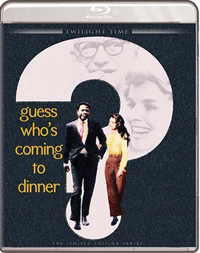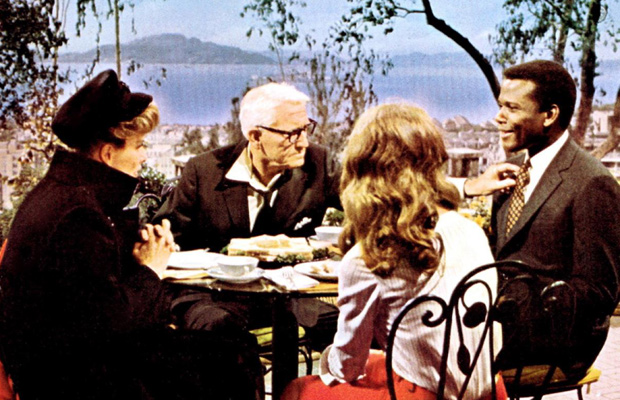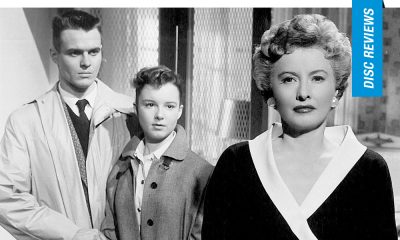Disc Reviews
Guess Who’s Coming to Dinner? | Blu-ray Review
 Like many of Stanley Kramer’s once incredibly topical titles, the iconic Guess Who’s Coming to Dinner? seems incredibly dated by today’s standards, even if the subject matter and representation of ‘interracial’ relationships and everything that antiseptic terminology implies hasn’t quite progressed as much as one would hope since this film thundered into cinemas in 1967. Sandwiched between two lesser beloved titles in his filmography, Ship of Fools (1965) and The Secret of Santa Vittoria (1969), this was Kramer’s third Oscar nod as Best Director and the last great hurrah (he’d direct a handful of other features throughout the next decade, and a 1975 television pilot version of this film).
Like many of Stanley Kramer’s once incredibly topical titles, the iconic Guess Who’s Coming to Dinner? seems incredibly dated by today’s standards, even if the subject matter and representation of ‘interracial’ relationships and everything that antiseptic terminology implies hasn’t quite progressed as much as one would hope since this film thundered into cinemas in 1967. Sandwiched between two lesser beloved titles in his filmography, Ship of Fools (1965) and The Secret of Santa Vittoria (1969), this was Kramer’s third Oscar nod as Best Director and the last great hurrah (he’d direct a handful of other features throughout the next decade, and a 1975 television pilot version of this film).
Successful San Francisco newspaper owner Matt Drayton (Spencer Tracy) and his liberal minded wife (Katharine Hepburn) are about to have their progressive viewpoints challenged when their white daughter Christina (Katharine Houghton) brings home her fiancé of one week, a black, but prominent doctor, John Prentice (Sidney Poitier). They met a week prior in Hawaii and have stopped by at her parents to get their blessing before flying off that night to Geneva. However, the Draytons have some reservations, as do John’s parents (Beah Richards, Roy Glen), flying in from Los Angeles to greet their son and potential daughter-in-law.
Much of this title’s pedigree rests on the laurels of its Academy Awards glory, scoring ten nominations, with director, editing, music, and art-direction alongside all the acting acknowledgments (Cecil Kallaway, Beah Richards, and Spencer Tracy), including Hepburn’s second of four wins and a statue for William Rose’s screenplay. There’s no denying its timeliness for 1967’s predominantly white audience and its success in capturing the public’s acclaim. And yet, there are significant narrative problems and hard to ignore contrivances tempering the film’s reputation.
Of course, Rose constructed the film with a heightened sense of dramatic tension, modeling the film’s forced deadlines of acceptance after tried and true vintage flourishes, perhaps meant to smudge up the racial component. After all, what parents wouldn’t be concerned with their child intending to marry a suitor after knowing each other for only one week? But Poitier and Houghton are concocted more as a case study than a believable couple, drawn in broad approximations of blind love (which perhaps explains why they were both absent from the ballot of nominees, with Poitier also overpassed for his performance in that same year’s In the Heat of the Night). Houghton, in particular, is quite grating, an obnoxious blend of doe-eyed uber-optimism and idealism, presented with a tinkling daintiness making her seem more like a Japanese anime cartoon than a real person.
It’s great to note Richards’ name as an Oscar nominee for her work, though in truth, the supporting characters here seem used for easy catharsis or comedic levity (Kallaway), or even righteous indignation (the dismissal or Virginia Christie’s racist employee of the Drayton’s).
As Tillie, a bitter Isabel Sanford (“The Jeffersons”) is perhaps the most notable point of interest in Rose’s screenplay, representative of sabotaging forces from disenfranchised peers brainwashed into believing everyone has a certain ‘place’ (see Samuel Jackson in Django Unchained for a more hysterical representation of this), but again, and perhaps to ensure its points, subtlety is never something in evidence.
Characterizations aside, the sterling cast handles Kramer’s social issue movie with a degree of respectable aplomb (working against the film’s rather unfortunate saccharine theme song “The Glory of Love”). Hepburn and Tracy are always a joy to watch (in retrospect, Hepburn beat out some stiff competition from Faye Dunaway in Bonnie & Clyde and Anne Bancroft in The Graduate), and the film was Tracy’s last, lending his final monologue an additional level of emotional resonance.
Though this ends hopefully, the two altercations directly preceding the finale, sequences showing the opposing father figures ‘worn down’ by other characters’ opposing arguments, feel incredibly false. As has been pointed out previously, the Poitier character’s browbeating of his working class father into agreeing to the marriage reads as incredibly problematic, while Richards’ accusation of Spencer losing his ability to ‘love a woman’ is what brings the undecided old codger unrealistically around. And though Rose is basically revamping age-old drawing room comedy tropes, Guess Who’s Coming to Dinner? perhaps has only come to symbolize something greater than it ever actually was to begin with—but there’s definitely power in that, as well as the idea of acceptance and humanity that should really be common sense to begin with.
Disc Review:
Twilight Time brings this necessary title to Blu-ray with in 1.85:1 high definition. Basically a chamber piece, it isn’t the greatest example of DoP Sam Leavitt’s (he won an Oscar for Kramer’s more daring racial themed drama, The Defiant Ones in 1959) abilities, especially considering the distracting artificiality of the set on the Drayton’s San Francisco terrace. However, those new to or happy to rediscover the title should be pleased with the significant extra features also included, along with optional commentary with film historians Eddy Friedfeld, Lee Pfeiffer, and Paul Scrabo.
Introductions:
Karen Kramer, Steven Spielberg, Tom Brokaw, and Quincy Jones all provide new, brief introductions to the title.
A Love Story for Today:
A half hour feature finds a recording of Kramer discussing his interpretation of the film as being concerned with the theme ‘love conquers all’ rather than interracial relationships.
A Special Kind of Love:
A seventeen minute feature includes montages set to voice recordings of Hepburn, while Houghton (her niece) appears to speak about the pressure Hepburn was under during filming due to Spencer’s failing health.
Stanley Kramer – A Man’s Search for Truth:
Another seventeen minute feature includes recordings of Kramer speaking about the importance of the motion picture maker dealing with truths in the increasingly politicized arena of film.
Kramer Accepts the Irving Thalberg Award:
Kramer’s two minute speech on accepting the Irving Thalberg Award is included.
2007 Producers Guild:
Karen Kramer discusses in this four minute segment the choice to present Al Gore with the Kramer award in 2007 (presented by Harrison Ford) for An Inconvenient Truth.
Final Thoughts:
Guess Who’s Coming to Dinner? opened in December of 1967. In June of that same year, the landmark Supreme Court case Loving v. Virginia overturned an 1883 precedent regarding race relations and marriage (currently, Jeff Nichols is making a film about the couple behind the case), explaining certain moments of dialogue pertaining to state by state legalities within the film. As these superficial differentiations between people have lessened, bit by bit in the decades since, Kramer’s film does feel like a dusty time capsule (though a 2005 remake from the ‘other’ perspective starring Bernie Mac and Ashton Kutcher would suggest we’ve a long way to go, though at least the word ‘negro’ as an acceptable descriptor has been dropped from modern vernacular). Still, as a film starring some of cinemas greatest actors, the combination of Hepburn, Poitier, and Tracy is still enough to hold the film’s artifice at bay—mostly.
Film Review: ★★★/☆☆☆☆☆
Disc Review: ★★★½/☆☆☆☆☆































